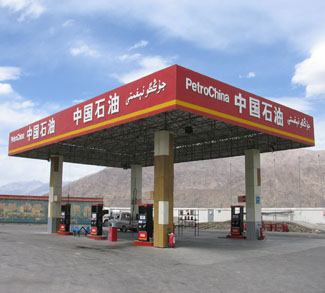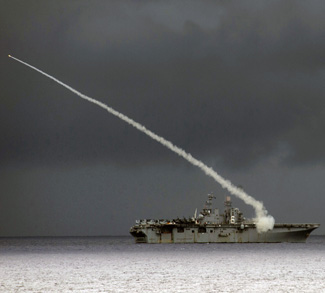Summary
Recent brazen anti-American militant attacks on supply convoys in Pakistan have succeeded in capturing a number of U.S. military vehicles destined for the Afghan war. The attacks underscore the importance of Pakistan, as both an ally and supply route, for the American war in Afghanistan. The position of NATO forces in land-locked Afghanistan remains unstable so long as their supply route through the mountainous Pak-Afghan border is threatened.
Analysis
Increasingly, the American war in Pakistan is taking centre stage as the anti-American insurgency continues to grow in its safe haven in the Pashtun areas of northwest Pakistan. Just last Monday, a brazen attack by Pakistan Taliban allied militants, under the command of Baitullah Mehsud, on a U.S. supply convoy travelling from Peshawar (Pakistan) to Kabul succeeded in capturing a number of U.S. military vehicles, including a U.S. military humvee.
The astonishingly audacious hijacking of U.S. military vehicles and supplies last week is not, however, the first time such an attack has succeeded. In August, two NATO vehicles were set ablaze in Karachi (the Pakistani port city where much of the American hardware is unloaded). Nor is the return trip any safer, as the U.S. lost over $10 million worth of four military helicopter engines en route from Kabul in an attack in April, barely a month after 36 fuel tankers were bombed in a border town near Afghanistan.
The Pakistan Taliban and allied militants are taking advantage of the narrow passes that are the only supply routes from Pakistan to Afghanistan through the rugged Hindu Kush mountainous border. The most recent attack occurred in the Khyber Pass, a legendary passage between the two countries of the highest military value. In fact, it is in the Khyber Pass that Afghani militants defeated the British empire in the 1800s, and, employing similar tactics, resisted the Russian empire just two decades ago. Clearly, then, the Taliban intend to add the American empire to that bloody list.
The significance of the Khyber Pass was highlighted immediately after the attack, when U.S. military convoys, including 450 supply trucks, were stranded in Peshawar until the Pakistanis could regain control of the supply route. Finally, on Tuesday, under cover of hundreds of heavily armed Pakistani military and paramilitary forces, the much needed supplies (including winter provisions for NATO forces operating in Afghanistan) resumed.
Currently, roughly 70% of U.S. supplies flow through Pakistan, further underscoring the importance of retaining the active cooperation of Pakistan as an ally, both to combat the anti-American militants based in Pakistan, and to ensure an available supply route to continue the war.
Interestingly, in order to ease its reliance on Pakistan, U.S.-led NATO struck a recent deal with Russia to open new supply routes through Central Asia. No doubt this will yet further increase Russia’s global influence (meaning that U.S.-NATO will have to make a number of key concessions to the Russians in return – such as scrapping Bush’s planned European based U.S. missile defence shield and pulling back from expanding NATO into the Ukraine and Georgia).
As the supply route situation exposes, America’s position in Afghanistan is much depended (as it is in Iraq) on the mood of neighbouring states.
In the end, then, the Obama administration will have to make many concessions to extricate itself from that other quagmire: Afghanistan.
Perhaps this explains why Afghani President Hamid Karzai recently extended a peace offer, with a personal guarantee of safety, to reclusive Taliban leader Mullah Omar – an offer that was immediately rejected, accentuating the Taliban’s newfound confidence.
Manjit Singh is a contributor to Geopoliticalmonitor.com



